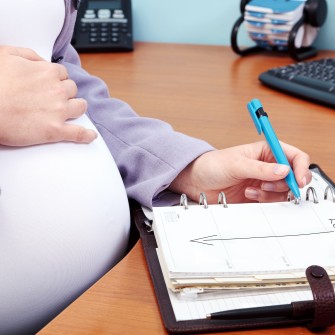Year one of shared parental leave has low take-up among men
A year on from the introduction of shared parental leave, research has revealed that more than four in 10 employers had not seen a single male employee take up their right to leave.
The research was carried out by the firm My Family Care among 200 employers. A quarter of the firms were not able to give a figure on fathers or fathers-to-be taking up their right to leave, while 11 per cent said that only between 0.5 per cent and one per cent of male employees were using shared parental leave, with a further 10 per cent reporting more than one per cent taking up the right.
Shared parental leave was introduced on 5 April 2015, and allows parents more flexibility in how they choose to care for their children during the 12 months following their birth. Parents are able to split 52 weeks’ leave, on top of statutory paternity leave for fathers.
Statutory pay set for shared parental leave is thought to be one of the problems. At a maximum of £139.58 per week, when payment is only received for 39 of the 52 weeks to be shared, many people have to consider their finances.
When surveyed, 80 per cent of employees said their decision to share leave would depend on their financial situation and whether their employer paid more than they were obliged to. More than half of businesses surveyed said that they offered enhanced pay for those taking shared parental leave, in line with what was offered to those taking maternity leave.
Other concerns for men related to career progression and taking leave being perceived negatively at work. In addition, 55 per cent of mothers who were questioned said they did not want to share their leave. Only 40 per cent of those surveyed said that sharing leave was encouraged by their employer.
The TUC believes there is more the government can do to encourage men to be more involved in childcare.
TUC General Secretary, Frances O’Grady, said: “Shared parental leave has been a small step towards getting dads more involved with childcare. But take-up has been very low and without better leave to rights and pay, many fathers will continue to miss out on playing an active role in the first year of their child’s life.
“TUC research shows as many as two in five new fathers are ineligible for shared parental leave as their partners are not in paid work or they fail to meet the qualifying conditions.
“If the government is serious about men being more involved after their child is born then they must increase statutory pay and give all new dads a right to their own parental leave that is not dependent upon their partners,” she said.
The Department for Business, Innovation and Skills pledged to look again at the policy for shared parental leave by 2018. The department released a statement which said: “Shared parental leave is provided to help mothers who want to return to work early share responsibility for the care of her child with the father or partner.
“There are many factors that affect a couple’s decision on how childcare should be managed and by whom. Take-up is likely to be higher in organisations that offer pay above the statutory minimum.”

